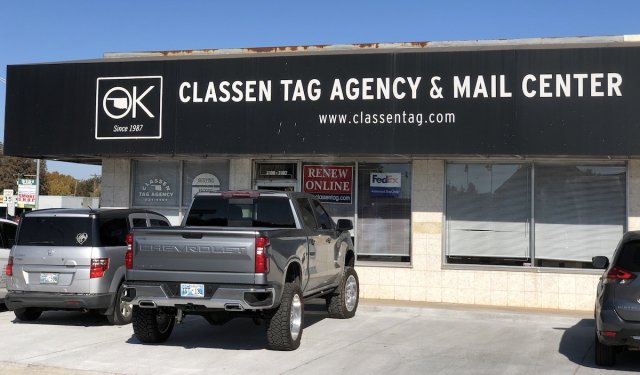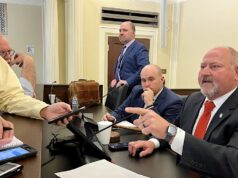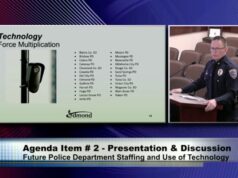
One day after 44 members of the Oklahoma House of Representatives sent Gov. Kevin Stitt a letter urging that he sign an executive order to address extensive wait times within the Department of Public Safety’s driver license programs, the governor did exactly that.
Stitt’s executive order essentially makes four changes:
- Allowing tag agents to renew, replace or downgrade Class A, B or C commercial driver licenses (which previously could only be done by DPS);
- Allowing tag agents to issue state identification cards if the individual — often an older Oklahoman who no longer drives but who needs a state ID — has a valid, expired or suspended driver license;
- Allowing career technology centers to administer the state’s written driving exam;
- Allowing commercial driving academies to administer CDL driving examinations to the general public and not just their students.
Capt. Sheridan O’Neal, the legislative liaison for DPS, said the executive order will help address the backlog of driver license and identification card demand that built up over the past 12 months owing to the implementation of federally compliant REAL IDs, state budget cuts and the COVID-19 pandemic, which caused DPS to suspend such services for about a month.
O’Neal also said the four executive order changes are expected to be codified in state statute by HB 1059 and HB 2465, which have both advanced through the House Public Safety Committee.
“We are excited that the Legislature is aware of this and they’re working with us. We’re working with the governor’s office,” O’Neal said. “We think the executive order is going to relieve some of the pressure, and once we follow it up with some of the legislation we are following, we think it’s going to make a difference.”
That would be good news for Oklahomans seeking driver license examinations or renewals. Backlogged demand and capacity limitations have pushed appointments for driving examinations out one to two months in rural areas and even longer in the state’s metros. Meanwhile, those seeking to take the state’s written driving exam to obtain a learner’s permit have been told to stand in line outside DPS offices starting as early as 2 a.m. with no guarantee they will be seen later in the day.
Wednesday, Stitt called the situation “unacceptable” in his executive order.
“The COVID pandemic has negatively affected so many of our normal processes, including renewing driver licenses and identification,” Stitt said in an accompanying press release. “No Oklahoman should have to wait months to obtain an ID or take a day off work to renew their license. I’m proud to sign this executive order today to help Oklahomans and eliminate the long wait times.”
O’Neal said there will “still be a little bit of lag time” on implementation of all of the order’s elements owing to a technological issue involving the “D-360 driver license system” implemented for REAL ID.
“Once the executive order is signed, we’ve still got to get the system up and running correctly, and then there has to be an upgrade sent out,” he said.
Clayton Taylor, the executive director of the Tag Agent Coalition, said fixing those system glitches will be required before tag agencies can perform the new functions.
“In talking with representatives from DPS, they are working on the software glitches in the system,” Taylor said. “That is the first step toward getting the system to work better.”
Getting career technology centers to administer written examinations, however, could happen more quickly. O’Neal said a pilot project with Moore-Norman Technology Center “will start very soon” with statewide implementation to follow.
O’Neal said DPS is looking at other internal options to address the driver license delays as well.
“We’re hoping to extend our hours in the evening and possibly do some Saturdays as well,” he said. “We’re looking at any type of savings we can identify, whether that’s payroll savings or revolving funds or wherever we can pull it from to make services better than it is currently.”
O’Neal said DPS administers more than 100,000 written examinations for motorcycle and standard vehicle licenses alone.
“We take it seriously. We know it’s a big deal. We’re very aware that things aren’t running optimally right now, but we are definitely looking at ways to make it more convenient for people needing a driver’s license or needing the written test,” O’Neal said. “We are trying to make those changes as quickly as we can with the executive order or legislation.”
‘Help Oklahomans throughout the state’
Signed by Republicans and Democrats from urban and rural areas of the state, the House letter dated Feb. 9 referenced how “Oklahomans across the state are facing enormous and lengthy wait times to schedule appointments to receive driver’s licenses or update existing licenses to REAL IDs.”
The full letter appears below and details the four requested actions that Stitt implemented in his executive order:
Oklahomans across the state are facing enormous challenges and lengthy wait times to schedule appointments to receive driver’s licenses or update existing licenses to REAL IDs.
As a result of social distancing due to the COVID-19 pandemic and the high demand for REAL IDs, our tag agencies are overwhelmed. These unreasonable wait times are leading to significant delays for our commercial drivers in the state, limiting our opportunities for economic growth and making it substantially more difficult for new drivers to become licensed.
Our constituents have faced this issue for months, and many have tried for several months to schedule appointments. Oklahomans across the state are facing the same issue and we the undersigned Legislators applaud your efforts to work with all parties and find a solution that meets the needs of our constituents in a timely manner.
As members of the Oklahoma House of Representatives, we support your efforts to enact an Executive Order with the help of the Oklahoma Department of Public Safety as well as the Oklahoma Legislature to address this alarming issue facing many Oklahomans. While there is legislation pending in the House to increase the number of authorized driver testing exam locations, we agreed this problem merits immediate action.
We request the following recommendations be considered for implementation by the executive order:
• Allow tag agents to renew, replace or downgrade a commercial driver’s license (CDL). The Dept. of Public Safety currently has to process all of them.
• Allow tag agents to issue an identification card if the person requesting the identification card has an existing state driver’s license file, even if the driver’s license is expired or suspended. Currently, the requesting person must have a valid driver’s license to receive an identification card from a tag agent.
• Allow third-party examiners (non-DPS CDL examiners) to test anyone with a CDL permit. Currently, they are only allowed to administer driving tests to their own students.
• Allow certain locations, such as Oklahoma Career Tech Centers, to administer driving knowledge written tests for Class D exams, with hopes to expand to CDL exams.
We believe the changes listed above would lend more authority and control to our local tag agencies and significantly reduce the wait times Oklahomans are facing.
Again we appreciate your efforts in enacting this Executive Order to help Oklahomans throughout the State.
Sincerely,
Other Stitt executive orders
The DPS executive order regarding driver license delays is Stitt’s third executive order over the past week.
Owing to shortages in liquified petroleum products like propane, Stitt on Wednesday also signed a new order suspending certain motor vehicle regulations for vehicles transporting liquified petroleum products.
Last week, Stitt responded to President Joe Biden’s federal executive order that stopped construction of the Keystone XL pipeline by signing his own order directing “every state agency to utilize all civil methods and lawful powers to protect its 10th Amendment powers and challenge any actions by the federal government that would seek to diminish or destroy Oklahoma’s ability to encourage job growth and the responsible development of our natural resources within the energy industry.”
The functional impact of that executive order was not immediately clear.




















